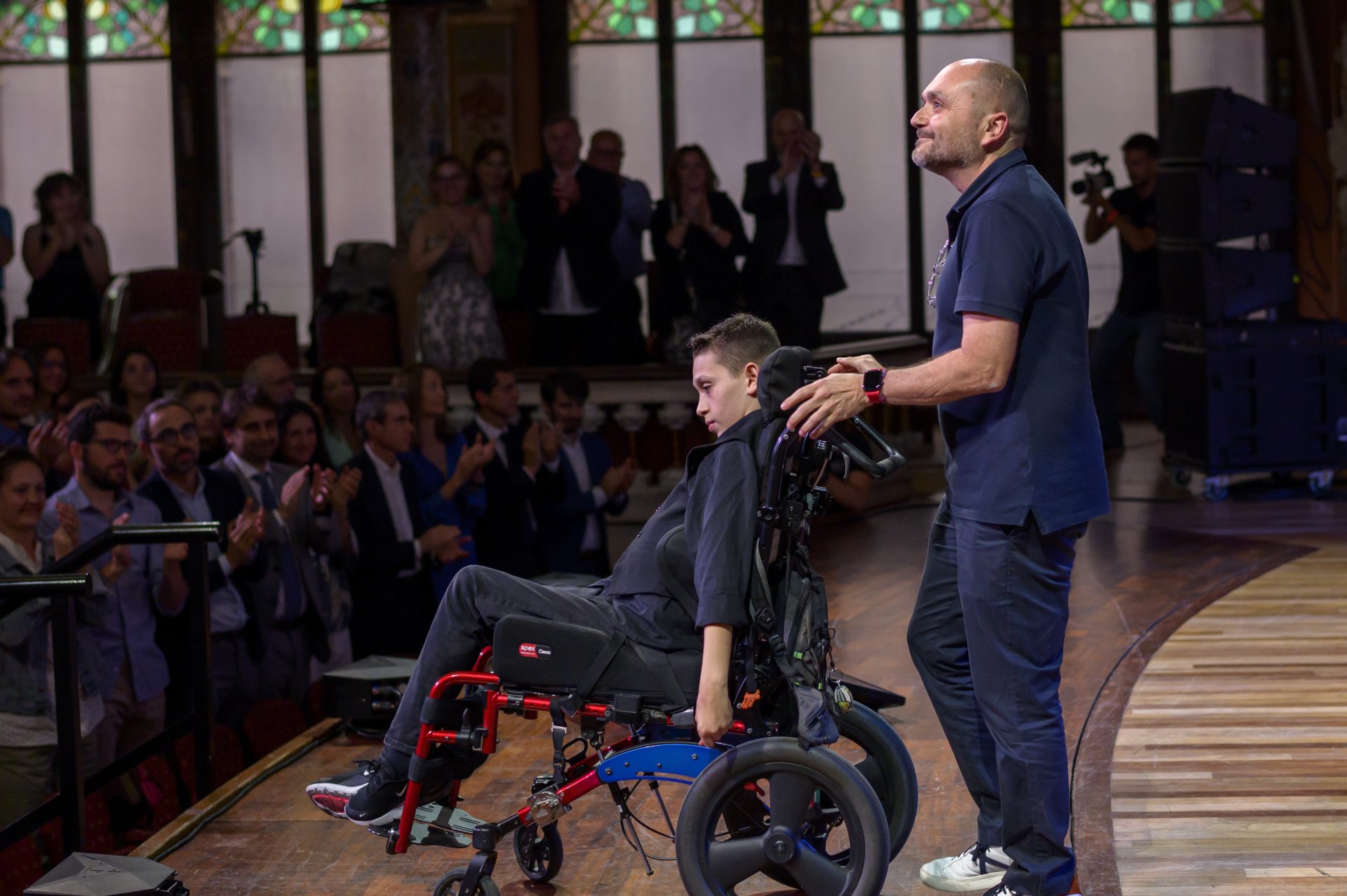
30 Jun 2.5 minutes that summarised 25 years of history
Chronicle
Two and half minutes. Maybe three. Or four. It doesn’t matter. Two-plus minutes in which Joel Bueno, a young man with spastic cerebral palsy who once told his parents that he wanted to be a musician, received a standing ovation. Impossible. But he did it. More than one thousand people, clearly moved, rose to show their respect for this young man who, casting aside all preconceived notions of what “normal” looks like, played music in the Palau de la Música. More than one thousand people, clearly moved, rose to show their respect for this young man who, casting aside all preconceived notions of what “normal” looks like, played music in the Palau de la Música. “Every breath you take”. One thousand, two-hundred people, there in that magnificent and emblematic Modernist building designed by architect Lluís Domènech i Montaner. The closing event for an equally emblematic year: that commemorating the first quarter century of the Universitat Internacional de Catalunya.
The song filled the Palau. “Every breath you take, every move you make, every bond you break, every step you take, I’ll be watching you.” It summarised exactly what we were doing in that remarkable Modernist setting: watching as Joel Bueno played this legendary song by The Police with his eyes: “Every breath you take. And every move you make. Every step you take. I’ll be watching you”. Using the EyeHarp system, an instrument in which the notes are arranged in a circle on a computer screen and are pressed with the help of an eye tracker. With the eyes of a boy who said “no”, and made the impossible possible.
“There is no future without a past,” remarked government minister Joaquim Nadal at the start of the event: “UIC Barcelona is a young, tangible reality that has been built on day after day, in a continuous present and thanks to the dream of those who founded it.” An impossible dream, as well –in a moment in which there was no legal space for private universities–, which they made possible. “Honour and glory to those who founded it,” proclaimed Nadal. These included Teòfil Sánchez, who received an honorary award from the rector for his role as founder more than twenty-five years ago. “Honour and glory to those who nurtured it,” such as Josep Maria Pujol, who, for almost twenty years, served as president of the University Board of Trustees, replacing Ramon Guardans in 1998.
For while twenty-five years aren’t many for an institution called on to last a thousand. It is certainly an age worth celebrating. Just over two decades ago, UIC Barcelona seemed impossible. Yet it is an institution founded by people who believed in this project –today a reality–, which each year welcomes thousands of students. “Many more believed,” explained one of the videos aired during the event, “convinced that educating people today will transform the society of tomorrow.” Over twenty-five thousand alumni now form part of this transformation that is spreading the globe. One of them, Architecture alumnus Valentina Riverso, received the Alumni Award for best social transformation project for her project “Toilets Block”, implemented at the Themi School in Tanzania; while another, Dentistry alumnus Ignacio Blasi, took home a career achievement award.
However, the evening’s most stirring moment occurred when Joel Blanco appeared on stage alongside five other musicians and a singer. A group forged thanks to the Sifu Group Foundation’s SuperArte grant programme; a foundation chaired by Cristina Rovira, also a fellow UIC Barcelona alumnus. This moment proved stirring because it epitomised exactly what this university, one celebrating its twenty-fifth anniversary, represents: a ship steered by individuals who each have a clear function. And in the Palau de la Música, all 1,200 people, as if they were one, rose to their feet and applauded for more than two minutes. One thousand, two-hundred hearts. One thousand, two-hundred souls touched by Joel’s art and who deserved these words from journalist Javier Quintano, a class of 2006 alumnus, there among them:
“This lengthy ovation celebrated not only a performance, but the value of even the most vulnerable human life, invaluable despite not fulfilling the utility criteria to which our world is accustomed.
“This ovation celebrated science and technology, which, through our research and hard work, are capable of helping us to help, of doing good, of enabling the blind to see, the lame to walk and the dumb to speak.
“This ovation celebrated altruism, service, the stubborn desire of humans to want to love and help others, despite receiving nothing in return. Joel has been helped by many people, but undoubtedly he is the one who has offered the greatest help, by showing us that what is not given, is lost.
“This ovation”, concluded the former Journalism student, “celebrated excellence, a will to succeed.”
UIC Barcelona brought its 25th anniversary celebrations to a close in one of Catalan culture’s most emblematic venues. It was, in the words of journalist Ramon Pellicer, the event’s host, “a tribute to the greatest legacy a university can leave behind: its students, transformed into world-changing professionals.” In this sense, and entirely by accident, these past 25 years were summarised to a tee in the 2.5 minutes of applause which culminated this highly personal story. And without any artificial intelligence whatsoever. Because, as Ramón López de Mántaras, a pioneering scientist in this field, reminded us, “AI has no life experience.”
And the life that inspired these 2.5 minutes symbolises the 25 years to come.
“XXXXXXXXXXXXXXXXXXXXXXXXXXXXXXXXXXX
XXXXXXXXXXXXXXXXXXXXXXXXXXXXXXXXXXX
Vídeoresumen





